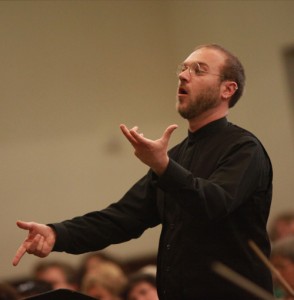
Matt Glandorf (2009). Photo: Bill Hebert.
by Anne Schuster Hunter
Conductor and organist Matthew Glandorf has been Artistic Director of Choral Arts Philadelphia since 2004 and Artistic Director of the Bach Festival of Philadelphia since 2008. During his tenure at Choral Arts Philadelphia, Glandorf has taken the group into such varied terrain as Rachmaninoff’s Vespers in September and last month, Rossini’s Petite Messe Solennelle, which was applauded by the Philadelphia Inquirer as “a fearlessly clear guided tour.”
But this is his first Messiah. He explains why in an e-mail interview:
ASH: Why Messiah now?
Glandorf: It is important for me to have a very specific reason to do a work—either I find something challenging about it or I wish to explore a particular angle. For example with the Rossini Petite Messe Solennelle, I was working within performance practices of the 1860’s.
With multiple performances of Messiah in town, I wasn’t sure what purpose another one would serve—until now. The thought of not only doing it at Easter time, as Handel intended, and doing it with a 40-voice choir without a conductor and with such an extraordinary ensemble such as Tempesta di Mare makes this project really exciting to me!
ASH: You’ve said that in recent years, early music has become your passion and specialty. Why?
Glandorf: When I was a kid, my family moved to North Germany where my father served as a Lutheran Pastor. The music of Schütz, Praetorius, Telemann, and Bach as well as period instrument ensembles were everywhere. At the time, I didn’t fully appreciate it.
With multiple performances of the Messiah in town I wasn’t sure what purpose another one would serve—until now.
Philadelphia has seemed somewhat of a late bloomer when it’s come to embracing historically informed performance. However, I feel lucky to be a part of it at this point in time as it seems to be gaining more and more attention!
ASH: You’ve directed Choral Arts Philadelphia since 2004. What directions are you going in?
Glandorf: When I took over, it was one of four symphonic-sized choruses in town. Over time, it became clear that my real love is in early and contemporary music. That has led to a natural downsizing of the chorus to 40 singers with a professional core. That really is the one kind of group that didn’t exist in this city.
However, whatever we tackle, we are deeply committed to exploring the context and intention of the repertoire, as well as questions of performance practice, regardless of the era—whether it’s the 17th century or even the mid-19th century.
ASH: You haven’t worked with Tempesta di Mare before, have you? And following Tempesta’s “conductorless” style, you’ll be playing in the orchestra, not conducting. How do you feel about that?
Glandorf: It is our first official collaboration together. I have worked with Gwyn and Richard as well as many of the Tempesta players in other contexts, with Choral Arts and with Saint Mark’s choir. It is a great challenge for the choir to sing “off of” what the orchestra is doing rather than following my hands. Rehearsals are proving that it is quite fun for them and for me!
ASH: Looking forward to the show! And thank you so much!
